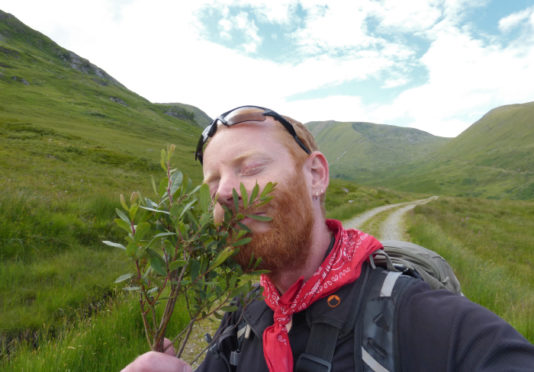So there I was, hammering staples into a boardwalk when, without warning, I was unwittingly catapulted north 100 miles to a quiet Scottish glen in the middle of nowhere.
I wasn’t expecting it, but the unmistakable smell of bog myrtle was so strong and so vivid that the transportation was instantaneous. Delighted, I started walking up the nearest Munro to take in the massive views, but then my brain interjected and said: “Erm, no, you’re in West Lothian.”
I looked up from my hammering. The boardwalk was next to an urban pond, at the edge of a car park in the middle of Livingston.
“Oh yeah,” I thought, somewhat surprised.
And yet, there at the edge of the pond was a massive bog myrtle bush. I don’t think I’d ever knowingly seen bog myrtle in West Lothian before, so the aroma of this one had caught me off guard, and perhaps not expecting to encounter it had made my “trip” more vivid than it would otherwise have been.
I exaggerate, of course. Said trip lasted mere milliseconds, as did the realisation that I wasn’t in the Highlands. Nevertheless, I took a leaf from the bush, crumpled it between my fingers and held it to my nose. Yep, it was upland Scotland in a single sniff.
Dreamy, so evocative, but under those controlled conditions it wasn’t nearly as potent as that first whiff, where I’d reacted spontaneously and emotionally to the smell before I was able to think consciously about what it was or, more to the point, where it was coming from. It was involuntary, and I’d had no control over where I ended up.
Not that I’d ended up anywhere in particular. Yes, I was “somewhere” in the Highlands, but the exact location wasn’t important because it was less a specific place and more a state of mind. It’s hard to describe, but I can only say that what was conjured was a general sense of contentment, fulfilment and wonder. A package of emotions I experience when I’m out walking in the hills.
I experience something similar when I get a whiff from a malty brewery. Smelling that, I’m instantly transported to Edinburgh, albeit not to any specific memory of that place, rather I feel like I’m reliving an entire era of my life when I’d just moved to the city and I was getting my life back on track after a rocky and unhappy patch.
That smell was the accompaniment to so many positive changes in my life thereafter, that whenever I smell it I never get just “hops”. Instead, I get a rush of intense nostalgia for a particular state of mind. A bundle of positivity, optimism, happiness, as though anything is possible. Maybe even a weird feeling of gratitude to the city itself.
Of course, involuntarily experiencing such sensations can cause problems if the experience you’re revisiting is something you’d rather forget. There are certain smells that rudely carry me off to horrid, miserable places before I have time to object. But interestingly, my “bad trip” smells tend to refer back to very specific events and times rather than more general states of mind. Perhaps that’s not surprising, because if an experience or smell is unpleasant then you’ll naturally take steps not to expose yourself to it again, so perhaps it’s more likely to be a short-lived thing?
Neat vodka, for instance, catapults me back to June 27 1997, unceremoniously dumping me cold, wet, hungover and miserable into six inches of Glasto-mud, unable to buy the warm woolly hat I’ve just presented to the stall owner because I’ve just realised that someone stole all the money from my wallet while I was collapsed in a vodka haze in my tent last night. Ugh, that really was a low point.
We left a day early, but not before discovering our car had been broken into.
Pleasant or not, it’s incredible how much power humble smells have over us, arguably more so than our other senses. If I see a golden eagle or I touch some bog cotton, I can think back to other times when the same things happened, but it requires conscious thought and effort on my part to recollect them. It can feel clunky and open to error, like thumbing through a Rolodex. Things get missed. Events get confused.
But smell’s ability to take us back to moments involuntarily and almost relive them, means it can feel more like time travel than simple recollection. This is apparently because, unlike our other sensory perception, smells are not routed into the brain via the thalamus – a kind of telephone exchange that passes information on to other parts of the brain to be interpreted. Smells instead go straight to the amygdala and hippocampus – structures closely associated with memory and emotions.
We therefore respond to smells emotionally whether we want to or not. It’s so much more immersive, which means it’s also incredibly powerful and suggestive. Just be grateful that your TV doesn’t yet have smell-o-vision during those ad breaks.
Ben Dolphin is an outdoors enthusiast, countryside ranger and former president of Ramblers Scotland

